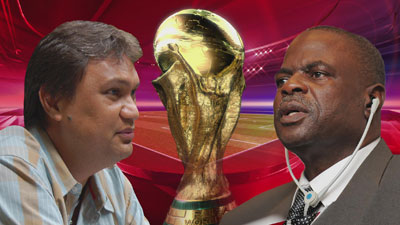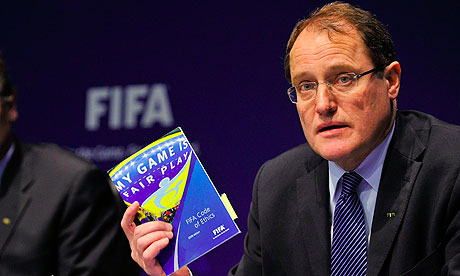By Duncan Mackay in Zurich
November 18 – Two members of FIFA’s ruling Executive Committee accused of corruption were today prevented from voting in the decision to award the World Cup in 2018 and 2022 after they were banned for three and one years respectively by the organisation’s Ethics Committee.
Nigeria’s Amos Adamu was suspended from all football activity for three years and Tahiti’s Reynald Temarii for one year by FIFA’s Ethics Committee, headed by former Swiss international Claudio Sulser, who were investigating allegations published in The Sunday Times that both were prepared to sell their votes.
It means that only 22 members of FIFA’s Executive Committee will be eligible to vote on December 2, FIFA general secretary Jerome Valcke confirmed.
But the Ethics Committee found insufficient evidence of collusion between Portugal/Spain and Qatar, who are bidding for the 2018 and 2022 World Cup respectively.
Adamu, 57, who has been a FIFA Executive Committee member since 2006 and is the director of sports development in his homeland, was also fined 10,000 francs.
Temarii, 43, a FIFA vice-president who is president of the Oceania Football Confederation, was given a fine of 5,000 francs as well as being suspended.
FIFA said Adamu and Temarii had breached general ethics rules as well as article 9,1 which demands “fiduciary duty” to soccer’s world governing body.

Adamu was also found to be in breach of article 11,1 which reads: “Officials may not accept bribes; in other words, any gifts or other advantages that are offered, promised or sent to them to incite breach of duty or dishonest conduct for the benefit of a third party shall be refused.”
The decision follows allegations that both had solicited bribes in exchange for their support of a candidate bid.
In an undercover operation, the newspaper’s reporters said they approached six current or former FIFA officials, all of whom “suggested paying huge bribes to FIFA Executive Cmmittee members.”
Two of the six asked for direct payment themselves, the paper reported.
Four other FIFA officials were disciplined by the Ethics Committee.
They Slim Aloulou, the chairman of the FIFA Dispute Resolution Chamber, was banned for two years while Ahongalu Fusimalohi – the general secretary of the Tonga Football Association – and Amadou Diakite – member of the Referees Committee – were both given a three-year ban.
Ismael Bhamjee of Botswana – a honorary member from the Confederation of African Football (CAF) – was suspended from taking part in football-related activity for four years.
FIFA stated that each member had breached various articles of their code of ethics but stopped short of claiming that any had been found guilty of corruption.
“For as long as I am in the Ethics Committee, we will have a zero tolerance policy for all violations of standards,” said Sulser after a three-day hearing.
“We don’t want cheaters, we don’t want doping, we don’t want abuses to be accepted.
“The damage caused to FIFF’s’s image is very great.
“When one talks of FIFA, there is generally a negative attitude out there, talk of corruption.”
Contact the writer of this story at zib.l1734856634labto1734856634ofdlr1734856634owedi1734856634sni@y1734856634akcam1734856634.nacn1734856634ud1734856634

